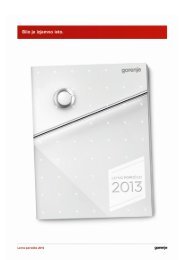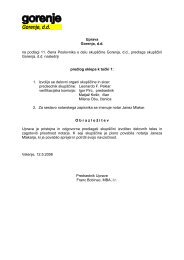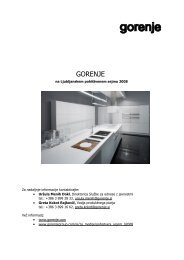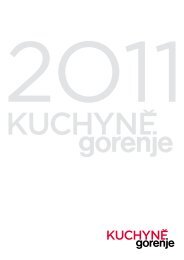ANNUAL REPORT 2008 - Gorenje Group
ANNUAL REPORT 2008 - Gorenje Group
ANNUAL REPORT 2008 - Gorenje Group
You also want an ePaper? Increase the reach of your titles
YUMPU automatically turns print PDFs into web optimized ePapers that Google loves.
38<br />
<strong>2008</strong><br />
3.1 ECONOMIC AND POLITICAL<br />
CONDITIONS<br />
THE WORLD<br />
• Considerable slowdown of world economic growth, which was 2.2% in <strong>2008</strong><br />
according to IMF data.<br />
• The negative turnaround was intensified by rapidly rising prices of oil and primary<br />
(agricultural) raw materials and the onset of the crisis.<br />
• In 2009, OECD forecasts a 2.75% decrease in world economic growth and a world<br />
trade volume of 10-15%.<br />
• Lowest levels of crude oil prices in the past four years.<br />
• At the start of the year, the price of a 159-litre barrel was approx. USD 100, at year<br />
end less than USD 40.<br />
• At the beginning of 2009, prices are stable and slightly above 40 USD/barrel.<br />
• On all major international stock exchanges, investors concluded the year with enormous<br />
losses. On an annual level, share values dropped sharply.<br />
EUROPEAN UNION<br />
• Economic growth slowed down in <strong>2008</strong> both in the euro area (0.8%) and in EU as<br />
a whole (0.9%).<br />
• The slowdown of economic growth was enhanced by the consequences of the<br />
financial crisis, which spread to other economic sectors due to stricter lending<br />
conditions and more expensive loans, as well as the diminishing trust between<br />
business subjects.<br />
• According to OECD forecasts, economic growth in EUR is expected to take an upward<br />
turn in the second half of 2009.<br />
• Inflation pressures are diminishing rapidly. According to Eurostat data, the inflation<br />
rate in December <strong>2008</strong> was 2.2%, in the euro area 1.6%.<br />
• Inflation pressures will continue to decline in 2009 due to falling prices of goods, rising<br />
unemployment, and the decline of GDP.<br />
• Weakening of the euro against the US dollar in the last months of <strong>2008</strong> due to<br />
changed expectations regarding future economic activities in the USA, the euro<br />
area, and the United Kingdom.<br />
• Strengthening of the euro in December <strong>2008</strong>, achieving 1.47 dollars per euro on a<br />
yearly average, which is 7.3% more than in 2007.<br />
• ECB decreased its key interest rate from 4.25% in November <strong>2008</strong> to 2.5% in<br />
December <strong>2008</strong>, and then to 1.5% in March 2009.<br />
• Reduction of Euribor (basis for determining loan expenses).

















